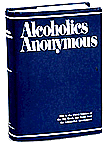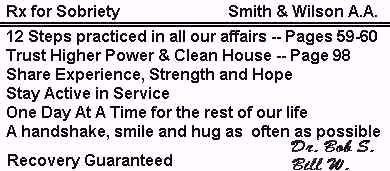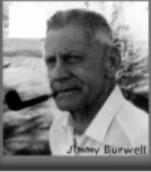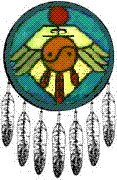

 Click The Images To Go To Page Indicated In The Flag
 Jimmy B. -- Jim Burwell The Agnostic and Author Of "The Vicious Cycle" Jim Burwell's influence on Bill Wilson in the writing of the Big Book was described by Wilson himself in Alcoholics Anonymous Comes of Age. Jim militantly opposed the usage of the word "God" in consistent adherence to his agnostic philosophy. A compromise was negotiated between Wilson and Burwell with the literary employment of such terms as "power greater than ourselves." Jim Burwell expressed in a 1957 recording at Sacramento that his agnostic stance had mellowed out over the years. However, his early militancy was perhaps a spiritual wonder! The compromise between he and Bill Wilson established an enduring principle in Alcoholics Anonymous, that of flexibility and acceptance of differing viewpoints on spiritual matters. That vital principle paved the way for hope for all suffering alcoholics seeking sobriety and recovery from a seemingly hopeless state of body and mind. One's religious affiliation, or lack of it; one's philosophical preferences, or none; one's theistic, or agnostic, or atheistic, or pantheistic, or virtually any relatively held notion or concept of a power greater than ourselves, could bare no relevance on one's membership in the Fellowship of the Spirit, thanks to Jim Burwell. Jim Burwell hit a hard bottom and came into association with Bill Wilson, Hank Parkurst, Fitz Mayo, and others, a total of 6 or 8 men in the fledgling group of recovering New York alcoholics, January 8, 1938, was dry for about 4 months, then got drunk, getting sober for good June 15, 1938. By that time Bill Wilson had written the first several chapters of Alcoholics Anonymous. The review of the first four chapters generated enthusiastic arguments. But things really became hectic when Bill had finished Chapter Five. (Bill said by then he had become the umpire rather than the author!) Members had drifted into two opposing camps -- a pro-religion faction led by Fitz Mayo, Burwell's boyhood schoolmate, argued that the book should reflect the teachings of the churches, missions, and, especially, the Oxford Group. The agnostic members, spearheaded by Jim and Hank Parkhurst, were vehemently against a theological or "religious" orientation, believing in a practical, psychological approach. Heated discussions went on for days and nights, but out of it all came the answer. The agnostics persuaded the others to accept the compromise language of "God, as we understand Him." This non-dogmatic idea opened the door to uncountable numbers of alcoholics who otherwise would not have entered our recovery program. Although Fitz and Jimmy B. were miles apart on spiritual philosophy, they were always close family friends. And fittingly, their final resting places are also close, just a few yards apart on the grounds of Christ Episcopal Church at Owensville, MD. The two were born in Maryland and were boyhood friends in southern Anne Arundel County. Had not this Maryland pair played their critical roles in A.A.'s infancy, our Fellowship in all likelihood would not survived its growing pains. They are among the many unsung heroes to whom we A. A.'s owe a debt that we cannot repay but partially, by continuing to carry the message to alcoholics who still suffer from our devastating disease. They both made vital contributions to Alcoholics Anonymous in the beginning of the fellowship. But for their individual input, countless thousands would never have joined A.A. and the fellowship itself might have been short-lived. John Henry Fitzhugh Mayo, Our Southern Friend," and Jim Burwell, whose story is "The Vicious Cycle," in the 2nd through 4th editions, were among the first few to get and stay sober in New York. Their early efforts also formed the foundation of A.A.'s rich history in Maryland. Their friendship flowered after Fitz's minister father became rector of Christ Episcopal Church at Owensville when Fitz was about four years old. Jim Burwell was the son of a Baltimore physician and grain merchant with family ties at Cumberstone, just a few miles from Owensville. As teenagers they attended the Episcopal School for Boys at Alexandria, VA. Alcohol began to take its toll on both in their twenties. Fitz had a promising career with an established firm aborted by the depression and took a teaching position in Norfolk, VA, where he drank heavily, lost his job, and his health deteriorated. Feeling great compassion for Fitz, another friend from childhood gave him part of his own farm at Cumberstone to homestead. Jim's story relates that, after losing several fine positions, he drifted into sales work and lost 40 jobs in eight years "before A.A. found me." In the fall of 1935, Fitz heard that Towns Hospital in New York was having some success in treating alcoholics, and he went there for the "cure." This was just a few months after Bill Wilson's historic meeting with Dr. Bob in Akron that marked the founding of Alcoholics Anonymous. On Bill's return to New York, he had set about trying to "fix" drunks he found at the Calvary Mission and Towns Hospital. His first success was with Hank Parkhurst, whom he had rescued at Towns. Fitz was the second to be picked up there and to maintain sobriety. After returning to his home in Cumberstone, Maryland, Fitz brought a number of prospects into his home in a vain effort to get them sober, much to the distress of his wife. He also began to make frequent trips to New York to join Bill and Lois Wilson and Hank at meetings of the Oxford Group, a "First Century Christian movement" with which early members of the fellowship were affiliated. When weekly meetings of the small group of alcoholics soon began to be held at the Wilson home, Fitz usually came up to attend. Fitz formed a close friendship with the Wilson's, who were frequent visitors to his home for several years, starting in 1936. Lois Wilson recalled in her book, Lois Remembers, that they often visited "Fitz and Co" at Cumberstone, and that on different occasions she was called on to care for Fitz's ailing wife and diabetic daughter. (When queried some years later, Lois said that Bill did not write any of the Big Book at Cumberstone, but some Maryland old timers believe he made notes there as he formulated ideas for the book.) At least as early as 1937, Fitz was spending much of his time trying to help drunks and gain a foothold for the fellowship in Washington, DC, where his sister Agnes worked. She provided Fitz a base of operations for his A.A. work there. His early efforts met with minimal success, but by the fall of 1939 he and Ned Foote had established the nucleus of a small group with staying power that began to function in Washington as A.A.'s southernmost outpost.
One of Fitz's early reclamation projects was the ill-fated Jackie Williams, who could not stay sober, dying of alcoholism. Fitz sent Jackie to see his old chum Jim Burwell, who was just coming off a binge at his mother's home in DC. Jim describes the encounter in his Big Book story: Jim and Jackie took the train to New York, where they met Bill and Hank. It turned out that Hank had fired Jim from a job years earlier. Jim was impressed by the sobriety of the New Yorkers and decided to join them "and take all that they gave out except the 'God Stuff'." He also took a job as a traveling salesman for Honor Dealers, a business Hank and Bill had started. Burwell later recalled that his association with the little band in New York started about the time that Hank had begun pressing Bill to put something of the program in writing. Up to that time, the "program" was carried solely by word of mouth in the New York and Akron meetings. The Akron contingent was initially against any publication -- it was still closely affiliated with the Oxford Group, from which the New Yorkers had severed ties in September 1937. Akron finally acquiesced, and Bill began writing in the spring of 1938. As Bill finished a chapter it would be reviewed and discussed by the New York members and a copy sent to Dr. Bob for review in Akron. This procedure brought lively debate in New York, particularly over the language of Chapter Five and the Twelve Steps. Fitz and Jim became central characters in the discussions, with Fitz favoring a Christian religious approach, and Jim aligned with those wanting a philosophical text devoid of references to God. The resulting compromise language of "God as we understood Him" was hailed by Bill Wilson as a "ten strike" that opened the way for those of all faiths and little or no faith to embrace and be embraced by Alcoholics Anonymous. Burwell can also be credited with adoption of A.A.'s Third Tradition -- "The only requirement for membership is a desire to stop drinking" -- as reported by Bill Wilson in Twelve Steps and Twelve Traditions (pp. 143-145). In World War II, Fitz rejoined the army where he was found to have cancer. He died October 4, 1943, eight years sober. Jim migrated to San Diego and continued active in A.A. until his death there September 8, 1974. Fittingly they rest a few yards apart just outside the chancel of Christ Church at Owensville, where their paths first crossed as youngsters. Born March 25, 1898, Jim Burwell carried the A.A. message to the end of his life, often starting new meetings in new places. He initiated Alcoholics Anonymous in Baltimore and Philadelphia. Later when he and his wife Rosa moved to the San Diego, California area, he was very instrumental in the growth of A.A. there. Jim, a small man with red hair, weighing about 135 pounds, constantly smoked a pipe, filling the A.A. rooms with smoke. He and his wife Rosa were both constantly active in A.A. service work and were elected to many A.A. positions many times. When not holding any elected positions, they were volunteers in any area of need. They were very involved in A.A. and were known as "Book People." If a line was not in the Big Book or Literature, they would not use it. Jim spent his early life in Baltimore where his father was a physician and a grain merchant. They lived in very prosperous circumstances, and while both parents drank, sometimes too much, they were not alcoholics. Home life was reasonably harmonious. There were four children, and both of his brothers later became alcoholics. One of his brothers died from alcoholism. His sister never took a drink in her life. He attended public schools until thirteen, then was sent to an Episcopal school for boys in Virginia where he stayed four years. But there he developed a real aversion to all churches and established religions. At school they had Bible readings before each meal and church services four times on Sunday. At seventeen he entered the university to please his father who wanted him to study medicine as he had. There he took his first drink and he always remembered it. He blacked out the first time he drank. In the spring of 1917, because he feared he would be kicked out of school, he joined the Army. Due to his OTC training, he entered with the rank of sergeant, only later to come out a private. During his military service he became a periodic alcoholic. On November 5, 1918, the troops heard a false report that the Armistice would be signed the next day, so Jim had a couple of cognacs to celebrate, then hopped a truck and went AWOL. His next thing he knew he was in Bar le Duc, many miles from base. It was November 11. The bells were ringing, and whistles blowing, for the real Armistice. Back in the States he migrated from job to job, unable to hold any for very long. In the eight years before he stopped drinking, he had over forty jobs. Finally, January 8, 1938, his boyhood friend Fitz Mayo ("Our Southern Friend") sent one of his early sponsees, Jackie Williams, to try to help him. When Jackie got drunk Jim called New York and was told that the two of them should come to New York. Hank, who had fired him eleven years before, offered Jim a job working with he and Bill Wilson at Honor Dealers. Hank fired him again, at least briefly, when Jim had his slip in June of that year. Jim met his wife, Rosa, on a 12th step call, the only time he ever 12th stepped a woman. They were married a year later. On February 13, 1940, with about two years of sobriety, Jim and Rosa moved to the Philadelphia area and started a group there. He also helped start A.A. in Baltimore. He wrote a history of A.A. in Philadelphia, and also wrote a history called "The Evolution of Alcoholics Anonymous." It contains some factual errors and his memory differed in spots from some of the other early A.A. members and that of Bill Wilson, but these were the first historical pieces written about A.A. Jim is usually given credit for the third tradition, that the only requirement for membership is a desire to stop drinking. He also is credited with the use of "God as we understood Him" in the Steps. Jim, an agnostic, was militantly opposed to too much talk of God in the Big Book, but he said later that his agnostic stance had mellowed over the years. When he updated his story for the May 1968 edition of the A.A. Grapevine, he told how in the early days in New York he started fighting all the things Bill and the others stood for, especially religion, the "God bit." But he did want to stay sober, and did love the understanding Fellowship. Soon he was number four in seniority in the New York group. He said he learned later that the New York group had a prayer meeting on what to do with him. The consensus seemed to have been that they hoped he would either leave town or get drunk. He added that his spiritual growth over the past thirty years had been very gradual and steady. Later he and Rosa moved to San Diego, CA, making their home at 4193 Georgia Street, where they lived until his death. One day, in a freak accident, his parked car, which apparently did not have the emergency brake set, slipped out of "park," rolled down his driveway and hit him, breaking his hip. He never fully recovered from the injury. In his last years Jim was often in a wheelchair, still constantly smoking his pipe. Following a long illness, he was admitted to the Veterans Administration Medical Center, La Jolla, California. He missed going to his meetings. However, that did not prevent him from being active. Jim started a new meeting there at the VA -- The Torrey Pines Thursday Night Discussion Group of Alcoholics Anonymous still meets there at 3350 La Jolla Village Drive, Room 2011 at 8:00pm. Jim Burwell died in the VA on September 8, 1974. He touched the lives of many. He was a very human being, capable of being criticized by some and adored by others. He died sober. That is as close to perfection as we will ever achieve. Jimmy B. was one of my "grand-sponsors." I met him once about the middle of 1974 when I was about 5 months sober, and one of my sponsors took me with him to go to a meeting and visit with Jim in the VA hospital, Jimmy Burwell and Bill Wilson communicated regularly for over 25 years by letter. Here are a few of the letters still extant. Letters by Date Jimmy Burwell -- Sober For Thirty Years
The Evolution of Alcoholics Anonymous
Index of A.A. History Pages on Barefoot's World As in so many things, especially with we alcoholics, our History is our Greatest Asset!.. We each arrived at the doors of A.A. with an intensive and lengthy "History of Things That Do Not Work" .. Today, In A.A. and In Recovery, Our History has added an intensive and lengthy "History of Things That DO Work!!" and We will not regret the past nor wish to shut the door on it!! ABC Page 60 -- Barefoot's Recovery Pages
KEEP COMING BACK!
On the Web Oct 23, 2002 in the Spirit of Cooperation Three mighty important things, Pardn'r, LOVE And PEACE and SOBRIETY |


